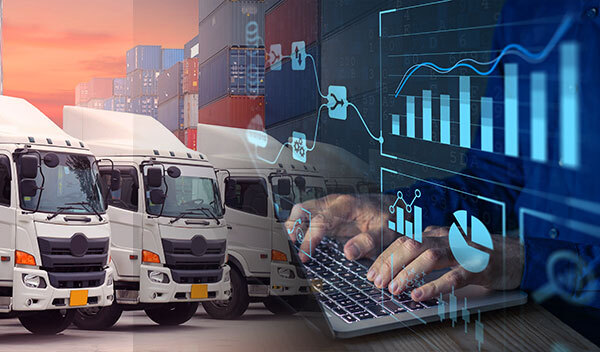No industry can survive without technology. The trucking industry is no exception. Over the years, we have seen how advanced technology has taken over the trucking industry. Trucking trends are evolving with time.
From transportation management systems that automate trucking operations to robust features of the engine to telematics that let you know where your fleets are at all times—technology in the trucking industry has come a long way.
As fleet technology is being used in almost every aspect of the truck, we could not leave behind tires. Yes—you heard that right. Tire technology has gradually gained popularity in the trucking industry.
Though tires won’t come to your mind immediately when you think of advanced technology, there is a lot going on in the tire technology department to make fleet owners and managers’ lives easier.
In this blog post, we will explore why trucking companies must invest in tire technology and how it is evolving and transforming the trucking industry.
Importance of Investing in Tire Technology
Trucking companies, all over the world, are responsible for transporting goods from one point to another on a regular basis. However, with the increasing demand for faster delivery times and greater efficiency, trucking companies are facing new challenges.
One of the key challenges is the cost of maintaining and replacing tires on their vehicles. According to a recent study, the average cost of a new tire for a commercial truck is around $400. However, the cost of maintaining and replacing tires can be much higher when considering the total number of tires required in a fleet, the cost of downtime, and lost productivity due to tire-related issues.
According to the American Transportation Research Institute (ATRI), tire maintenance is the second-largest operating expense for trucking companies.
Trucking companies can reduce operating costs and improve overall operational efficiency by investing in tire technology. For instance, using tires with longer tread life and better fuel efficiency can help companies save costs on both tires and fuel.
In addition to that, tires with built-in sensors can provide real-time information on tire pressure, tread depth, and other significant metrics, allowing fleet owners and managers to proactively address potential issues before they turn into serious problems.
Trucking companies can further improve safety on the roads by investing in tire technology. Tires with advanced tread patterns and compounds can provide better traction and handling, reducing the risk of accidents caused by tire-related problems.
On the other hand, tires built with sensor technology can alert drivers and fleet managers about potential problems, helping them prevent blowouts and other fatal incidents.
What’s New in Tire Technology?
Technology in the world of truck tires is constantly evolving. Let’s discuss the recent innovations in tire technology and understand how they can help trucking companies.
Smart Tires
Tire manufacturers are making intelligent tires that have the ability to communicate information about performance in real-time, including temperature, speed, pressure, and wear. Each tire will have a built-in sensor that sends information to the cloud, where fleet managers can access it for individual vehicles or the entire fleet of vehicles.
Smart environments such as fleet telematics can also help fleet managers improve efficiency and sustainability. The smart tires use a sensor that sends critical tire information to a cloud-based application, enabling fleet managers and drivers to detect and resolve potential repair issues that might lead to vehicle downtime.
When a tire needs replacement, real-time data, including the tire brand, size, model, speed, and traction ratings, will be available on a single window for fleet managers to review.
Tire Design
A good tire should have two important characteristics—strength and durability. Fleet managers prefer getting tires that are durable and can help improve fuel economy.
The tires should be tough enough to endure the cutting and chipping on rough roads and then move the truck comfortably and safely down the highway.
Fleet Services
Another modern trend in tire technology is Tires as a Service, just like Software-as-a-Service and other similar offerings. For instance, several tire manufacturers, including Goodyear, are offering management and monitoring for fleet owners and managers.
The TireReady service manages the complete life cycle of a tire with the help of a subscription model. There’s another option that offers active on-vehicle monitoring to help detect leaks and high temperatures in real-time.
In fact, fleet managers can also largely benefit from several other tools including a drive-over reader device and a digital inspection toolset by getting effective, digitally based tire-monitoring solutions. These solutions help them obtain information rapidly.
Similarly, Michelin offers a predictive tire program in which tires are closely inspected on-site for irregular wear, low pressure, and uneven tread depths. Fleet managers can obtain customizable reporting to monitor performance data, forecasting, and cost per mile.
What Are the Top Tire Performance Factors?
To become more efficient and gain a competitive edge in the transportation industry, trucking companies need to invest in new tire technology. Below, we have outlined the top tire performance factors that carriers must look for before investing in new tires.
Removal Mileage
Treadwear rating is a measure of a tire's expected lifespan in miles, based on the depth of its tread measured in 1/32 inches. Tires with a higher treadwear rating are expected to last longer than those with a lower rating.
Tires that are designed to be more fuel efficient may have a lower tread depth in order to reduce weight and rolling resistance. In recent years, new tire designs have been developed that can improve removal mileage by 15%.
Low Rolling Resistance
Tires with lower rolling resistance can result in significant fuel savings over time, but they may come at the cost of decreased durability and grip, depending on the vehicle's usage.
Driver Behavior
By modifying their driving habits, drivers can increase the lifespan of their tires by up to 35% by decreasing wear and tear and identifying issues early before they cause a major breakdown.
Tire Pressure
Proper tire inflation is the most basic way to enhance tire longevity. It is important to follow the manufacturer's guidelines for the tire's size and load capacity.
Conclusion
In conclusion, trucking companies must invest in tire technology to stay competitive and efficient in today's fast-paced transportation industry. By reducing costs, improving efficiency, and increasing safety, tire technology can help trucking companies stay profitable and provide better service to their customers.
Along with tire technology, businesses should also consider investing in fleet technology. For instance, the use of transportation management systems (TMS) such as LoadStop can help companies simplify complex trucking operations, improve business workflows and processes, and increase the bottom line.
With this in mind, it is essential for trucking companies to make advanced technology a priority in their operations and to keep an eye out for new developments in the field.
About the Author: Sara Naveed
Sara Naveed is a creative and digital content writer who uses her creative skills to develop and edit professional web content. Being a writer has always been her dream. She earnestly hopes people appreciate her writing—an asset she deeply covets. Using her 8+ years of working experience, she writes for trucking industry experts who are always looking for better technological solutions to their problems.











